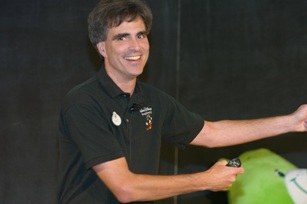 Randy Pausch was a computer science professor at Carnegie-Mellon University, truly one of the finest higher education institutions in America. He passed away from pancreatic cancer but left a legacy, including the Last Lecture. Here is a written transcript. Read it. It is long but it is brimming with insight.
Randy Pausch was a computer science professor at Carnegie-Mellon University, truly one of the finest higher education institutions in America. He passed away from pancreatic cancer but left a legacy, including the Last Lecture. Here is a written transcript. Read it. It is long but it is brimming with insight.
Profound, uplifting, sad, and even a bit silly, this lecture captures both the heart and mind of what it means to be an educator. Pausch had fun learning and his students did too…all the while doing cutting edge work in Gaming and Virtual Reality.
Albert Einstein said something to the effect that Imagination is more important than Knowledge. Here is the quote, “Imagination is more important than knowledge. For knowledge is limited to all we know and understand, while imagination embraces the whole world, and all there ever will be to know and understand.” I disagree somewhat with what Einstein said. It is not often that I sense that I can counter an Einstein observation, and usually it is in matters of Theology, where he was actually rather misinformed and uneducated. Since I received a “D” in high school Physics, I cede that realm to him categorically. When I was 18, I could hardly even get out of bed in the morning to face another day. Physics just demanded too much of my mind, preoccupied with other matters. I am sure now, if I took the course, I could get a “C.”
As an Educational Psychologist, I see Imagination as Knowledge in the sense that knowledge attainment, the actual process, is itself a knowledge-oriented endeavor. Figuring out how to know something…what are the underlying habits of the mind, heart, and soul, that cultivate knowledge? Although it is a deep inquiry, I think one of the key premises is to keep our eyes and ears and minds open to grasp that what we know should be contested and challenged and not accepted de facto. Imagination resides in the unexpected insight that transcends mere factoid collection. It is profoundly non-trivial and it is a worthy pursuit. And it should be exciting, and fun, and hard.
It does not mean that we jettison conviction but our convictions must be continually tested and tried to see if they can bear the weight of serious scrutiny. When I became a Christian in college, it was very critical to me that Christianity be reasonable. Not in the sense of completely understood but credible. Since I believe the events in the Bible actually happened as the Bible tells them, Christianity is real in the truest sense of the word. The stories happened in time and space; they were real and so were all of the actors and places. It does not mean that the faith does not have some fantastic elements to it that are hard to fathom. But, I take it as a given that they are facts and my response is to them is one of trust. For when something is Supernatural, it is bound to not be typical. That is its very definition.
I challenged my newborn faith by reading critiques of Christianity. I still remember one of the books called An Atheists’ Values (which I believe is still downstairs in my subterranean cinder block and pine wood plank library in the basement). I figured that if Christianity were true, bring on the challenges, and the sooner the better. I had a Christian friend who tried to dissuade me from such an inquiry. I walked away from that book hardly destabilized at all. It was pretty sophomoric. The author tried to argue that since God did not smite bullies on the spot with lightening bolts, that somehow temporal evil was proof that God did not exist. As if earth is the only stage…and eternity–the great bifurcation–was not true and where all accounts come due.
Wondering, being willing to submit to the pursuit of Truth wherever it leads–even to a Cross, a jail and chains, or to a chaired seat in Philosophy at Oxford–is the commitment required for an engaged mind.